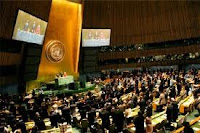The two different terms “old” and “new” diplomacy might make us to see the diplomacy as a something what was before and what is already passé. And something brand new what is relevant now. However I would suggest understanding diplomacy in terms of an evolutionary process. [1] Like an organism it is able to adapt to a new conditions. If it would not adapt it would not survive, therefore particular techniques and practices has disappeared and new have come.
 In the old diplomacy there was a tendency to include just diplomats who have the legitimacy to negotiate, those who are representing particular country. The diplomacy was a mirror of personal relations between ambassadors, foreign ministry and heads of states. Now days in the era of globalization those traditions are changing. The role of ambassador is changing. His power is declining but his functions have been broadened into different spheres (economic, cultural,...)[2] There is also a new trend - conference diplomacy. It is not just two or three states negotiating. Now multilateral conferences held by states are more common. It is argued that continuous, confidential and informed negotiations are now days impossible.[3] More participants of conference make secrets difficult to keep in secret. It also means that diplomacy has more opened to public. Maas media and information technology allow us to find out more.[4] However, this does not mean that all the issues are announced to the public. The selective release of information will still play a role in diplomacy and politics.
In the old diplomacy there was a tendency to include just diplomats who have the legitimacy to negotiate, those who are representing particular country. The diplomacy was a mirror of personal relations between ambassadors, foreign ministry and heads of states. Now days in the era of globalization those traditions are changing. The role of ambassador is changing. His power is declining but his functions have been broadened into different spheres (economic, cultural,...)[2] There is also a new trend - conference diplomacy. It is not just two or three states negotiating. Now multilateral conferences held by states are more common. It is argued that continuous, confidential and informed negotiations are now days impossible.[3] More participants of conference make secrets difficult to keep in secret. It also means that diplomacy has more opened to public. Maas media and information technology allow us to find out more.[4] However, this does not mean that all the issues are announced to the public. The selective release of information will still play a role in diplomacy and politics. In addition there is no condition that the involved actors in conferences are just states representative. There are new actors in diplomacy. The world has recently undergone a boom of non-state actors. It can be argued that along with globalization, global problems emerged. Sometimes those problems are complicated and needs specialists to bring effective and appropriate solution. Specialist can be those above mentioned non-state actors for example the summit in Copenhagen in December 2009. Environmental changes are complex issues. It was not just state representative but also business leaders and scientists, who were contributing to the summit. However there is also argument against. It is claimed that more actors involved in negotiating might make it very difficult to find an agreement. Others are in opposition to this view, they argue that more actors are bringing more information that might be crucial for decision making.
In addition there is no condition that the involved actors in conferences are just states representative. There are new actors in diplomacy. The world has recently undergone a boom of non-state actors. It can be argued that along with globalization, global problems emerged. Sometimes those problems are complicated and needs specialists to bring effective and appropriate solution. Specialist can be those above mentioned non-state actors for example the summit in Copenhagen in December 2009. Environmental changes are complex issues. It was not just state representative but also business leaders and scientists, who were contributing to the summit. However there is also argument against. It is claimed that more actors involved in negotiating might make it very difficult to find an agreement. Others are in opposition to this view, they argue that more actors are bringing more information that might be crucial for decision making. [1] R.P. Barston, Modern diplomacy, Harlow : Pearson Longman, 2006, p 4
[2] Ibid p 5
[3] Kenneth W. Thompson, The New Diplomacy and the Quest for Peace, The United Nations: Accomplishments and Prospects (Summer, 1965),Vol. 19, No. 3, pp. 394-409
[4] Department of Communication, Purdue University, Managing reputation and international relations in the global era: Public diplomacy revisited, , West Lafayette, 12 June 2005,


No comments:
Post a Comment